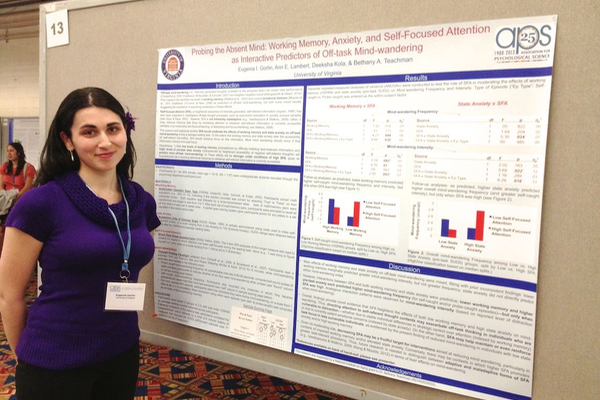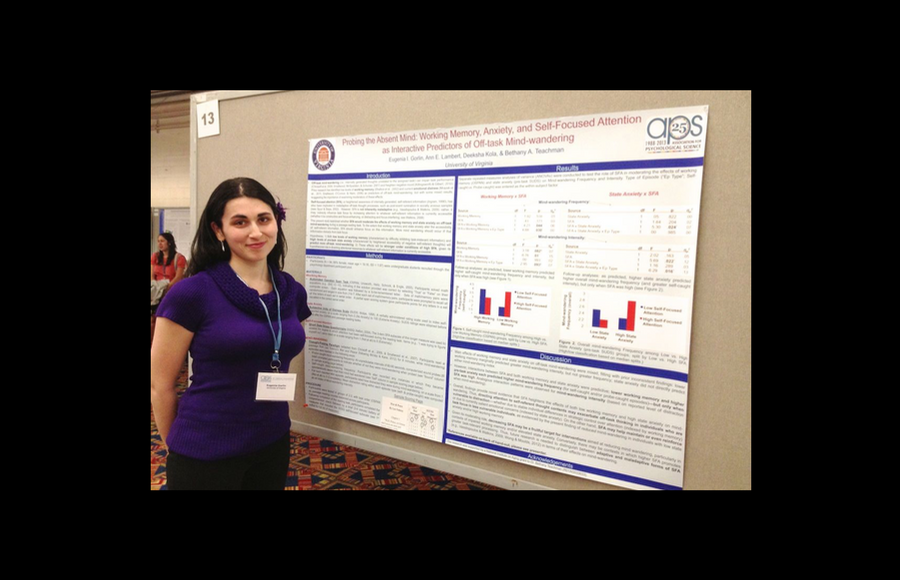
In anticipation for the Ayn Rand Student Conference this November,
we tapped one of its speakers Gena Gorlin on the shoulder to share a
sneak preview of her upcoming talk, which explores how students
can think about and achieve long-term, personal happiness.
* * *
Before we begin, could you tell me a little bit about yourself?
I completed my Ph.D. in clinical psychology at the University of Virginia and my doctoral internship training at Brown University. I am currently a research and clinical postdoctoral fellow at Boston University’s renowned Center for Anxiety and Related Disorders (CARD). I have extensive experience conducting psychotherapy with distressed young adults and high-performing athletes and professionals.
I’m also a graduate of ARI’s 4-year Objectivist Academic Center program, a former campus club founder and president, and a proud founding member and current board member of TU / STRIVE. I spend most of my spare time either swing dancing, catching up on the past 50 years’ worth of great TV shows, writing songs and poems, playing violin, or singing (mostly vocal jazz these days, though, fun fact, I did get a year-and-a-half of conservatory training in opera performance a long, long time ago).
How did you discover Objectivism?
In 8th grade, my English teacher assigned The Giver. I had already read it several times, so I asked if I could read something else. My teacher suggested I read Anthem. I loved it, but thought it was probably a one out—no author writes more than one book that good. I didn’t think about it again until my freshman year of high school, when I was unhappy with my social life and priorities and I was searching for answers. I read Perks of Being a Wallflower, which happens to quote The Fountainhead. That reminded me of Ayn Rand and how much I had enjoyed Anthem, so I asked my dad to bring home a copy of The Fountainhead from the library. The rest is history.
Why talk about happiness and psychology? How does this apply to students’ lives on campus, and why should they care?
It isn’t obvious or automatic to know how to choose your goals or values. I’ve worked with a lot of college students and college is a really pivotal time to decide how things will go. Of course, you never reach a time when you can’t turn your life around, but college is your window of opportunity to get started in the right direction because it’s your first time autonomous from your parents, deciding what classes to take, how late to stay out, who to live with, etc. You’re so free to explore and try different majors and styles of thinking and ways of life.
College is this really unique opportunity that you could either benefit or fail to benefit from depending on what tools you have and how self-aware you are. It’s a time to seize the reins and become intentional and purposeful about how you manage your motivations and the habits that you form—not just basic habits like doing laundry and going to bed on time, but also mental and emotional habits, like whether you spend time dwelling unconstructively on setbacks and failures, or whether you’re able to regain confidence and spring back into “action” mode. In short, it’s a prime time to work towards success and long-term happiness.
Happiness is often dismissively thought of or regarded as this easy, cheap, superficial pursuit. It’s really important to realize what an exacting and difficult and noble pursuit it actually is. Part of the challenge is to figure out how to integrate long-term planning and goal-pursuit—which is, of course, a major focus of our college years, and properly so—with the conscious experiencing and enjoyment of the here-and-now. Just as it’s unhealthy to neglect the consequences of our current actions on our long-term, future happiness, so it’s equally unhealthy to focus on chasing future ends at the expense of ever living in the present. To take seriously the pursuit of happiness as your “moral purpose” (Ayn Rand’s radical idea) is to strive for it in every moment of your life, and not just as some distant future end to which your daily misery is the means. But to strike this balance between future-based planning and present-moment savoring is a delicate and complex science, as I will be discussing in my talk.
How do happiness and psychology relate to free will?
Our psychological health and happiness crucially depend on our willingness to take active responsibility for those aspects of our mental and physical life we do control, such as the focus of our attention in any given moment, or the voluntary actions that we take. Just as crucially, it depends on our ability to relinquish control and practice serene acceptance of those aspects we do not control, such as how we feel in any given moment, or the unhelpful thoughts that occasionally pop into our minds. Thus understanding the nature and scope of our free will—that is, of what we do and do not control—is central to the pursuit of happiness. In a sense, our free will is our most powerful weapon as human beings: it can elevate us to great heights or it can destroy us, depending on how we wield it. My talk will provide the initial sketch of a “how-to” guide for wielding this weapon more confidently and effectively, and for maximizing its positive impact on our life and happiness.
What do you hope students will gain from your talk, and what can they do to change the culture on their own campuses?
I hope students will be able to apply the tools and strategies I discuss, and notice their lives improving as a result. I hope they observe themselves growing more confident and courageous and see the fruits that follow from that.
Relatedly, by consciously identifying the importance and possibility of shaping one’s own life in a way that leads to happiness and doing so intentionally, these students will serve as role models. They can spread the word on their campuses in a way that allows for this idea and relevant methodology to spread. They can be change-agents, leading by example.
My talk will also normalize various forms of unhappiness. Depression and anxiety are normal. Embracing free will and becoming happier is a process. The first step is to be honest with ourselves and accept and embrace all the ways in which we aren’t there yet. Face reality. There is no shame or weakness in facing the things that make us unhappy or currently aren’t going well. In fact, it takes a lot of courage. I want to emphasize this in my talk, because I think it is something many college students need to hear.
In essence, I want to help the students who come to my talk to be change-agents for themselves. They have agency over whatever change it is that they want to make. They can be agents in their own lives and then they can become agents of change in their own local campus culture and beyond.
How would this talk have helped you when you were 18-21?
A lot! I get better with each additional strategy and insight I pick up, in ways I wouldn’t have imagined because I didn’t know there was so much to learn about happiness. I wish I could have known about these skills sooner because I would have had that much more time and leisure to enjoy their fruits. These skills are both surprisingly learnable and surprisingly difficult. You can do it, but it won’t be quite as easy as you may expect! That said, don’t ever settle for something that isn’t quite you or quite good. Use these skills to find the happiness you deserve.
Any closing remarks?
I want to say that I’m deeply grateful for the life-long friendships, inspiring mentorships, and countless personal and professional growth opportunities that my involvement with ARI and TU/STRIVE has afforded me. I am, in fact, an infinitely happier person thanks to the existence of these organizations and I’m excited at the chance to serve as a kind of ambassador to the newest generation of student leaders and intellectual activists joining our incredible community. Welcome, you guys, and I can’t wait to meet you at AynRandCon! [TU]



